India is a land of diversities and is known for its multiple ethnicities, religions and cultural backgrounds. So, naturally, this diversity also translates into our laws. India is a secular country and these values of secularism are enshrined in Article 25 to 28 of the Constitution of India, which grants the freedom of religion to its citizens. Therefore, in India, the legal system is based on personal laws while taking religion into consideration.
However, on the other hand, Uniform Civil Code (UCC) provides that all sections of the society shall be treated equally irrespective of their religion and that this code shall be applicable uniformly. It is based on the proposition that there is no connection between law and religion in a civilized society. So, in today’s blog, we will try to understand what UCC is all about and also go over some recent developments with respect to the same.

What is Uniform Civil Code (UCC)?
Article 44 contained in Part IV (Directive Principles of State Policy) of the Constitution of India defines Uniform Civil Code. However, since Article 44 falls under Part IV, it is not enforceable by any court of law as provided under Article 37.
Article 44 provides, “The State shall endeavour to secure for the citizens a uniform civil code throughout the territory of India”, which would provide a uniform personal law for all citizens of the country. It is also known as One country, one rule.
The main aim behind the implementation of UCC is to set a uniform law that governs the personal matters of all the citizens irrespective of religion, to address the discrimination against vulnerable sections and to harmonise the diverse cultural groups across India.
UCC will cover the following areas–
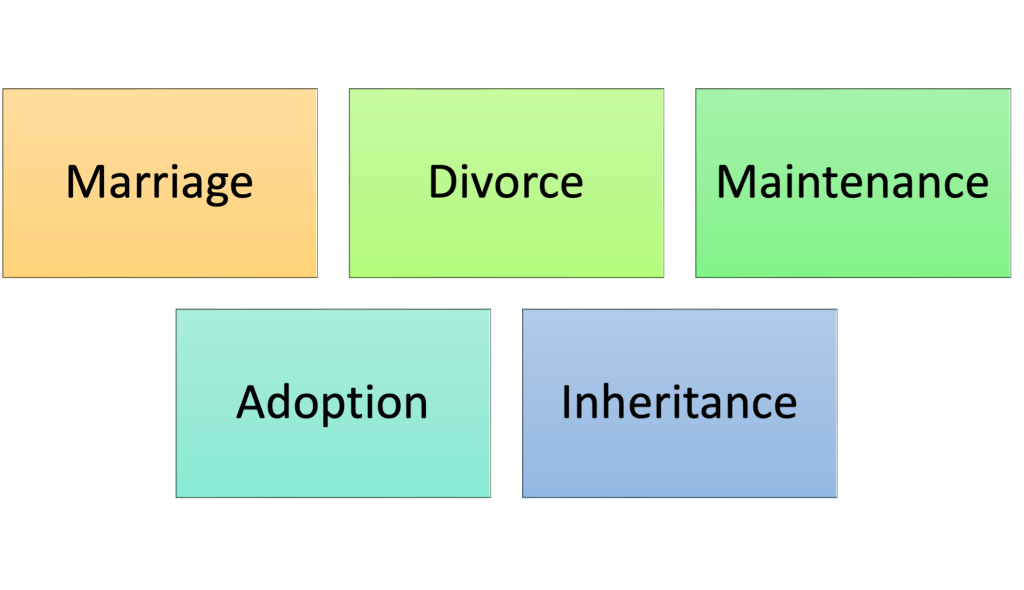
Uniform Civil Code Debate
The debate for the UCC in India dates back to the colonial period-
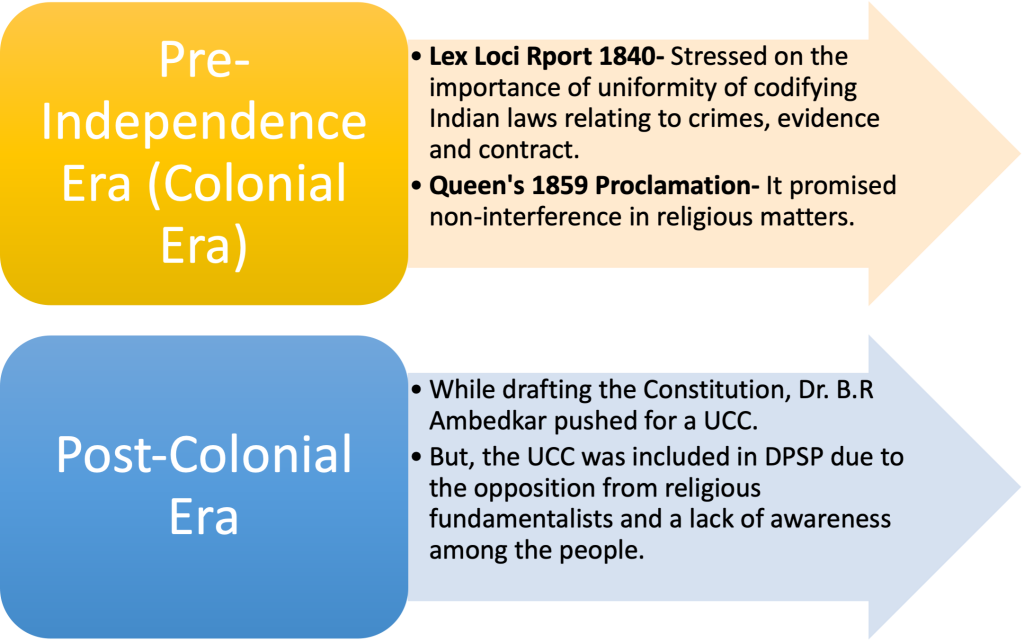
So, while the criminal laws were codified and became common for the whole country, the personal laws continue to be governed by separate codes for different communities.
What is the need of Uniform Civil Code?
Now that we have understood what UCC means and provides, let’s understand why we need UCC in the first place.
For that, we need to know the difference between personal laws and public laws.
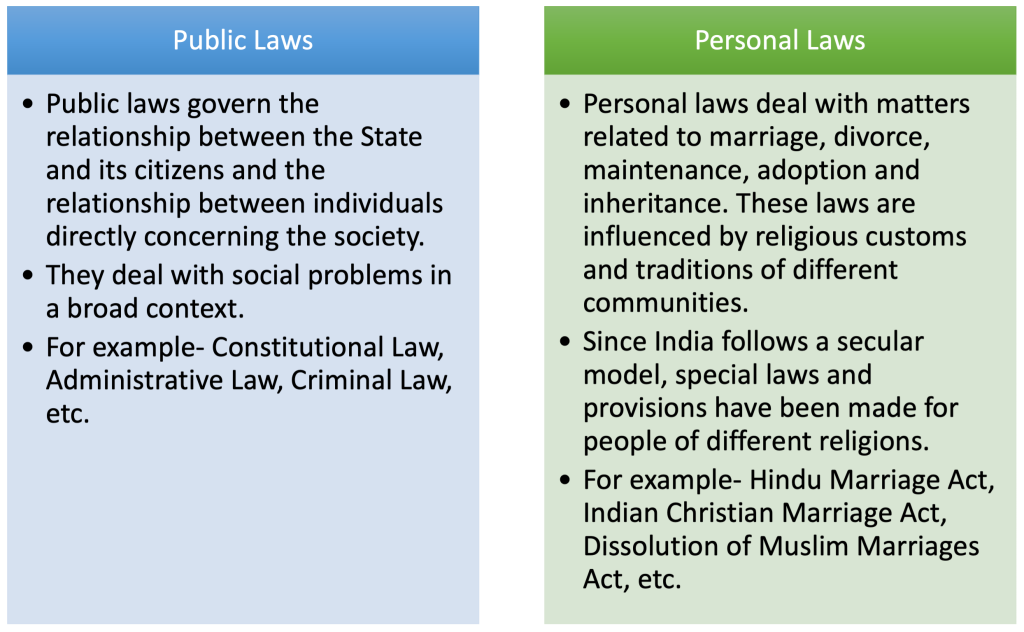
- Therefore, the need for UCC arises based on the fact that there are many differences and discrepancies within the personal laws since there is no uniformity.
- Moreover, it is meant to provide protection to vulnerable sections including religious minorities and women.
- There have been examples where the personal laws denied the rights of women.
Let’s understand this with the examples of Shah Bano Case & Sarla Mudgal Case–
Shah Bano Case
In this case, a woman called Shah Bano was divorced by her husband using triple talaq and was also denied maintenance. The District Court & the High Court ruled in her favour. However, the husband appealed to the Supreme Court where he contended that he had fulfilled all his obligations under the Muslim law, where the maintenance was to be paid only till the iddat period i.e. three lunar cycles.
So, the Supreme Court ruled in Shah Bano’s favour under section 125 of Criminal Procedure Code 1973, which deals with the maintenance of wives, children and parents. Since Criminal Procedure Code is a public law, it is applicable to all the citizens irrespective of religion. The Supreme Court further recommended that a Uniform Civil Code should be enforced.
Impact- This historic decision of the Supreme Court led to the passing of the Muslim Women’s (Right to Protection on Divorce) Act, 1986 by the Parliament. Due to the passing of this Act, section 125 of Criminal Procedure Code is no longer applicable on Muslim women.
Sarla Mudgal Case
Issue raised– Can a Hindu husband married under the Hindu law, solemnize a second marriage by embracing Islam?
In this case, the court held that the Hindu marriage solemnized under Hindu law can only be dissolved on any of the grounds specified under the Hindu Marriage Act 1955. Conversion to Islam and marrying again, would not by itself dissolve the Hindu marriage under the Act and therefore, a second marriage solemnized after converting to Islam would be an offence under section 494 (Bigamy) of the Indian Penal Code(IPC).
The two examples discussed above show how sometimes personal laws can be detrimental to the rights of women and also shines a light on how a UCC would be a step in the right direction to secure gender justice, equality and dignity of women.
Arguments For UCC
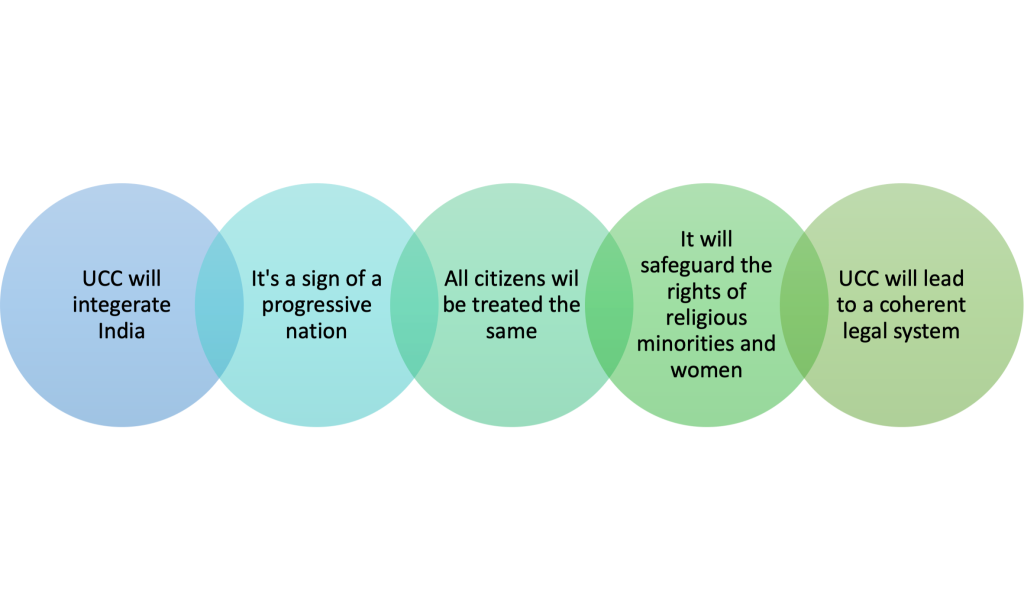
Arguments Against UCC
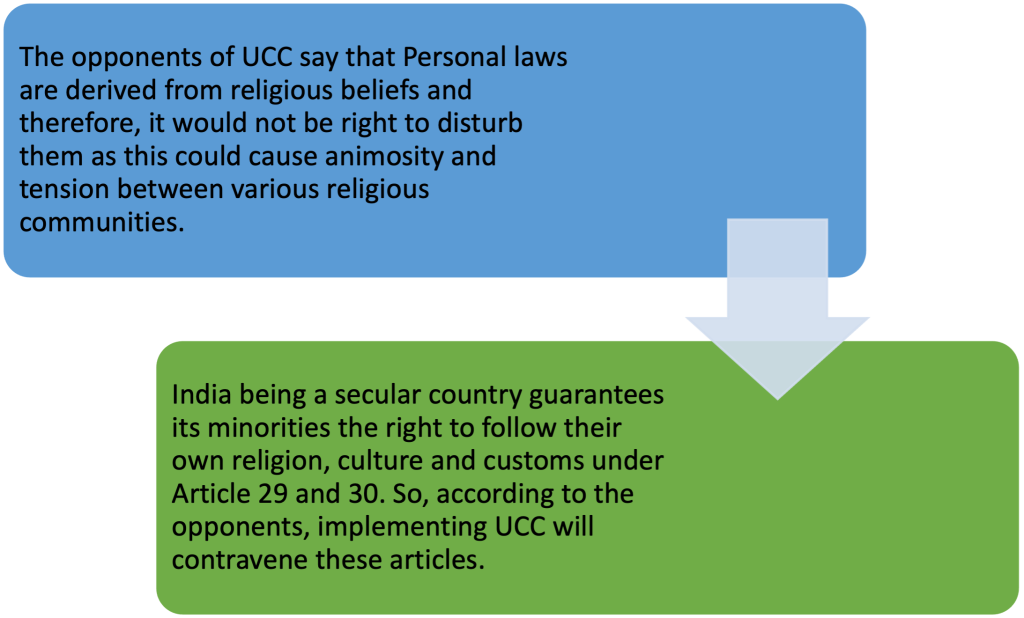
Uniform Civil Code: Recent Developments
- Recently, Uttarakhand Chief Minister Pushkar Singh Dhami announced that Uttarakhand will soon begin the implementation of the Uniform Civil Code.
- This announcement came a few days after he took charge as the CM of Uttarakhand for the second time.
- This decision was taken at the first cabinet meeting held in Dehradun to fulfill a major pre-poll promise made by the CM.
- For this purpose, the Uttarakhand government will constitute a “high-powered” expert panel consisting of legal experts, senior citizens and intellectuals for preparing the draft of the UCC for the state.
- If successful, Uttarakhand will become the second state in India to implement the Uniform Civil Code.
- The first state to have its own UCC in the form of a common family law is Goa. It still follows the Portuguese Civil Code that was introduced in the 19th century in Goa and wasn’t replaced after its liberation.
Challenges in Implementation of UCC
The task of actually formulating a set of rules that will govern all communities is a very challenging one considering the diverse range of interests and sentiments to be accounted for.
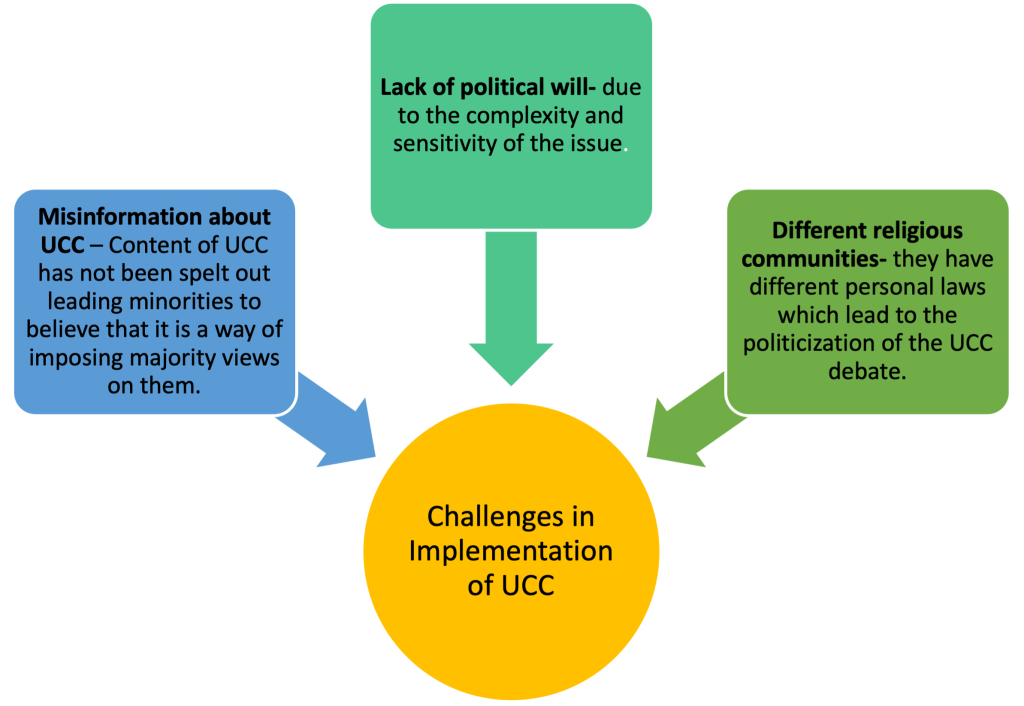
Suggestions for Implementation of UCC
For the implementation of UCC, the following measures can be considered-
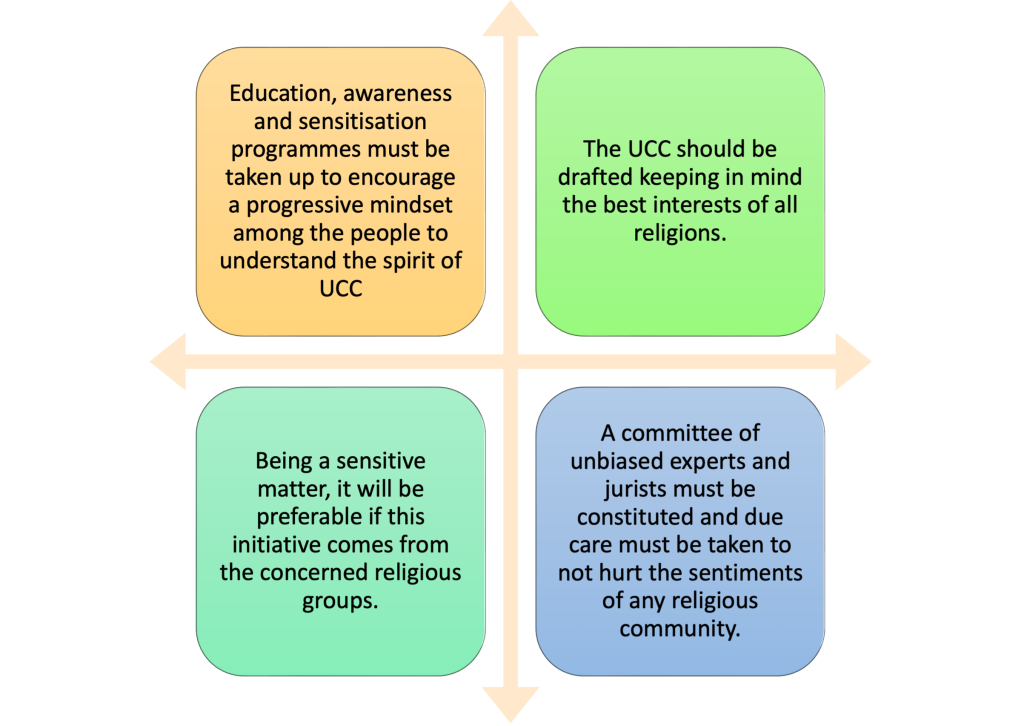
Prepping for Bank Exams with ixamBee
While preparing for Bank Exams, candidates need to be aware that segments like the ESI Paper and General Awareness segment always includes questions related to latest current affairs. That’s why you need a comprehensive and strategic approach while preparing for exams like SEBI Grade A, RBI Grade B and RBI Assistant to name a few. ixamBee serves as a valuable ally for aspiring RBI Officers on their journey to success. ixamBee provides an array of resources designed to equip candidates with the knowledge and skills needed to excel in various posts within the Reserve Bank of India. One of the standout features of ixamBee is its offering of Free Mock Tests, allowing candidates to simulate exam conditions and assess their performance. These mock tests are crafted to mirror the actual RBI exam patterns, providing invaluable insights into the question types, time management, and overall exam dynamics.
Additionally, ixamBee provides access to Previous Year Papers, offering a glimpse into the historical trends of RBI exams. Analyzing past papers aids candidates in understanding the exam’s nuances and helps them tailor their preparation accordingly. Online Courses offered by ixamBee are meticulously curated by experts in the field, covering the entire syllabus comprehensively. These courses provide structured learning modules, ensuring that candidates are well-versed in each subject. BeePedia, another resource from ixamBee, is a dedicated platform for preparing the General Awareness section.
Conclusion
To sum up, the main objective of the Uniform Civil Code (UCC) is to treat all its citizens equally irrespective of their religion. The enactment of the UCC will simplify many laws that are scattered presently on the basis of personal religious beliefs. It will work to simplify the many laws related to marriage, divorce, adoption, maintenance and succession by making them one for all which will be applicable to all the citizens of India irrespective of their faith.
To help you prepare 50% faster for competitive exams, ixamBee provides a free Mock Test Series and all the Current Affairs in English and Current Affairs in Hindi in the BeePedia capsules for GA Preparation. You can also get the latest updates for Bank PO, Bank Clerk, SSC, RBI Grade B, NABARD, and Other Government Jobs.
Also Read
White Label ATMs: All the Important Details to Know
FDI, FPI and FII: All the Details to Know
Understanding the Reserve Bank of India Act 1934














